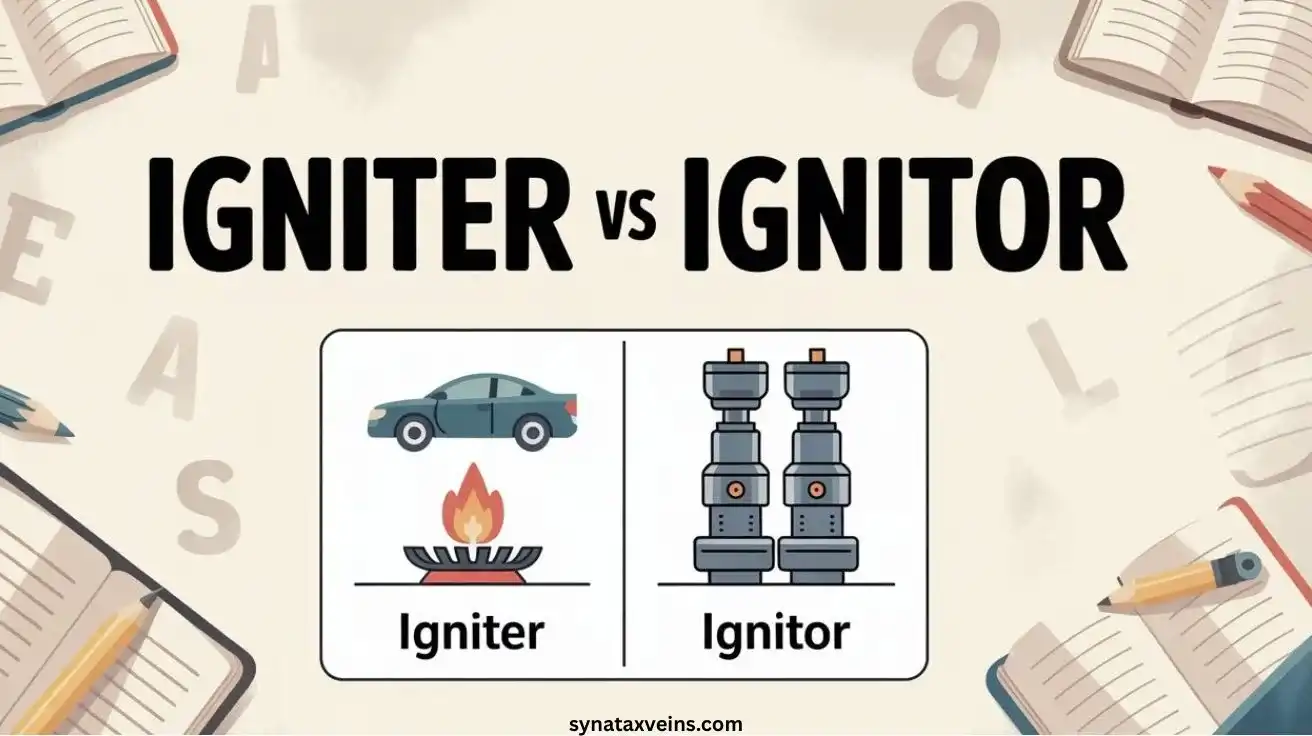You’ve probably seen both igniter and ignitor in manuals, science articles, or online forums. They look nearly identical, yet people still wonder which spelling is correct. In truth, both words mean the same thing — a device or tool that starts combustion or causes something to ignite. But how did two spellings come to exist, and when should you use each one?
Let’s clear up the confusion once and for all. This guide explains the difference between igniter and ignitor, where each is used, and which spelling suits your audience best. You’ll also find easy examples, fun facts, and memory tricks to make it stick.
Igniter or Ignitor – The Real Difference Explained
Both igniter and ignitor describe a mechanism that lights or sparks a flame. You’ll find them in engines, stoves, rockets, and even fireworks. The only difference is in spelling — not meaning. So whether it’s a jet engine’s ignitor or your home heater’s igniter, both words work perfectly.
However, spelling preference depends on who’s writing. Some people choose igniter because it looks more natural, while others use ignitor to match technical documentation. Think of it as the same word wearing two different outfits.
Igniter vs Ignitor: Which One Is Correct According to Dictionaries?
Most dictionaries recognize both spellings, but igniter is the more widely accepted form. Modern English style guides recommend igniter for general use because it follows the same -er pattern as other device names like “lighter” or “starter.”
That said, ignitor isn’t incorrect — it’s just less common. You’ll still see it in engineering or aerospace industries where traditional terminology sticks around. In short, both are correct, but igniter is preferred in modern writing.
Igniter or Ignitor in American and British English – Regional Differences
American English favors igniter, while ignitor occasionally appears in British or older technical texts. Even in the UK, though, igniter is slowly taking over as the standard. It’s the spelling you’ll find most often in product manuals and instruction guides.
Here’s a quick comparison for clarity:
| Region | Preferred Spelling |
|---|---|
| United States | Igniter |
| United Kingdom | Igniter (preferred), Ignitor (rare) |
Why Two Spellings Exist – A Quick Look into Etymology
The double spelling comes from English’s flexible nature. The word originates from the Latin “ignīre,” meaning to set on fire. When English borrowed it, two suffix styles — -er and -or — developed. Both meant “a person or thing that performs an action.”
Words like “actor” and “advisor” use -or, while “starter” and “lighter” use -er. Over time, both versions stuck, which is why you’ll see igniter and ignitor coexisting today. Language evolves, and sometimes, it refuses to pick just one favorite.
Industry Usage – Where Igniter and Ignitor Are Commonly Used
Different fields have different preferences. Let’s take a quick look:
| Industry | Common Spelling | Example |
|---|---|---|
| Household Appliances | Igniter | “The stove igniter isn’t working.” |
| Automotive | Igniter | “Replace the ignition coil and igniter.” |
| Aerospace / Engineering | Ignitor | “Technicians tested the rocket ignitor.” |
| Manufacturing | Igniter | “The plant produced 1,000 igniters last week.” |
So if you’re writing for a scientific or aerospace audience, ignitor might feel familiar. For everything else, stick to igniter — it’s modern and widely accepted.
Grammar Tip – How to Use Igniter or Ignitor in a Sentence
Here are a few simple examples to keep you confident:
- The igniter in the grill stopped sparking.
- Engineers replaced the ignitor before the launch test.
- Our lab ordered new igniters for the experiment.
Whichever spelling you choose, be consistent throughout your writing. Mixing the two in one piece can confuse readers.
READ MORE >>> Aerial vs Arial: What’s the Real Difference? (2025 Grammar Guide)
Igniter or Ignitor in Everyday Language
Beyond the technical sense, both words also carry metaphorical meaning. You might hear someone say, “She was the igniter of that idea,” meaning she sparked inspiration. Using it figuratively gives writing more energy and flair. In daily speech and writing, igniter again feels more natural and visually familiar.
Common Misconceptions About Igniter and Ignitor
Many believe ignitor is wrong or outdated — not true. It’s simply a traditional spelling that’s less used today. Others assume each word has a different meaning, but no dictionary supports that claim. In reality, both forms refer to the same thing: a tool, device, or person that causes ignition.
The only real “rule” is to stay consistent with your chosen form based on audience and region.
Easy Way to Remember the Correct Spelling
Here’s a handy trick: if you’re unsure, think of the word lighter. It ends with -er, just like igniter. That’s your clue that igniter fits modern English spelling patterns. Or remember this short rhyme:
“For flames that glitter, spell it igniter.”
Simple, right?
Fun Facts About Igniter or Ignitor You Probably Didn’t Know
- The earliest recorded use of igniter appeared in the 1800s during the early combustion-engine era.
- Ignitor gained traction in engineering papers around the 1900s but never overtook igniter.
- Some rocket scientists still prefer ignitor simply because their manuals used that form decades ago.
- Both words share the same plural forms — igniters or ignitors.
Igniter or Ignitor – Which One Should You Use in 2025? (Final Verdict)
If you’re writing for a general audience, blogs, or product guides, use igniter. It’s clear, familiar, and accepted worldwide. If you’re writing a scientific report or working in aerospace, ignitor may be fine — just keep it consistent.
In today’s English, igniter is the spelling that sparks the most recognition and aligns with modern standards.
Frequently Asked Questions
What is an igniter?
An igniter is a small device that creates heat or a spark to start a fire or combustion process. You’ll find it in gas stoves, cars, heaters, and rockets — basically anywhere something needs to ignite to work.
How do you spell ignitor or igniter?
Both spellings are correct, but igniter is the modern and more popular version. Ignitor is still valid, yet it appears more in old or technical documents. If you’re unsure, use igniter — it’s the safer choice.
What is the use of ignitor?
An ignitor helps start combustion by producing the first spark or heat source. It’s vital in machines like furnaces, jet engines, or fireworks where ignition begins a reaction or operation.
Who is an ignitor?
In a figurative sense, an ignitor can also describe someone who sparks inspiration, motivation, or change. For example, a leader who starts a movement could be called an ignitor of progress.
Is ignitor a real word?
Yes, ignitor is a real word. It’s simply an alternative spelling of igniter. While both mean the same thing, igniter is the spelling most commonly used in modern English writing.
What’s the plural of igniter or ignitor?
The plural form depends on your chosen spelling. If you use igniter, the plural is igniters. If you prefer ignitor, it becomes ignitors. Both are grammatically correct — just remember to stay consistent throughout your writing.
Conclusion – Final Thoughts on Igniter vs Ignitor
Both spellings are correct, but igniter shines brighter in everyday English. It’s modern, readable, and fits perfectly across technical, academic, and casual writing.
So next time you’re editing a manual, drafting a report, or explaining how something lights a fire, remember: both words work — but igniter is the one that truly ignites clarity.

